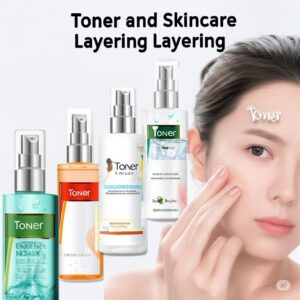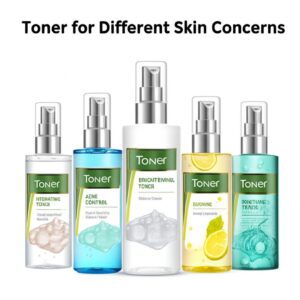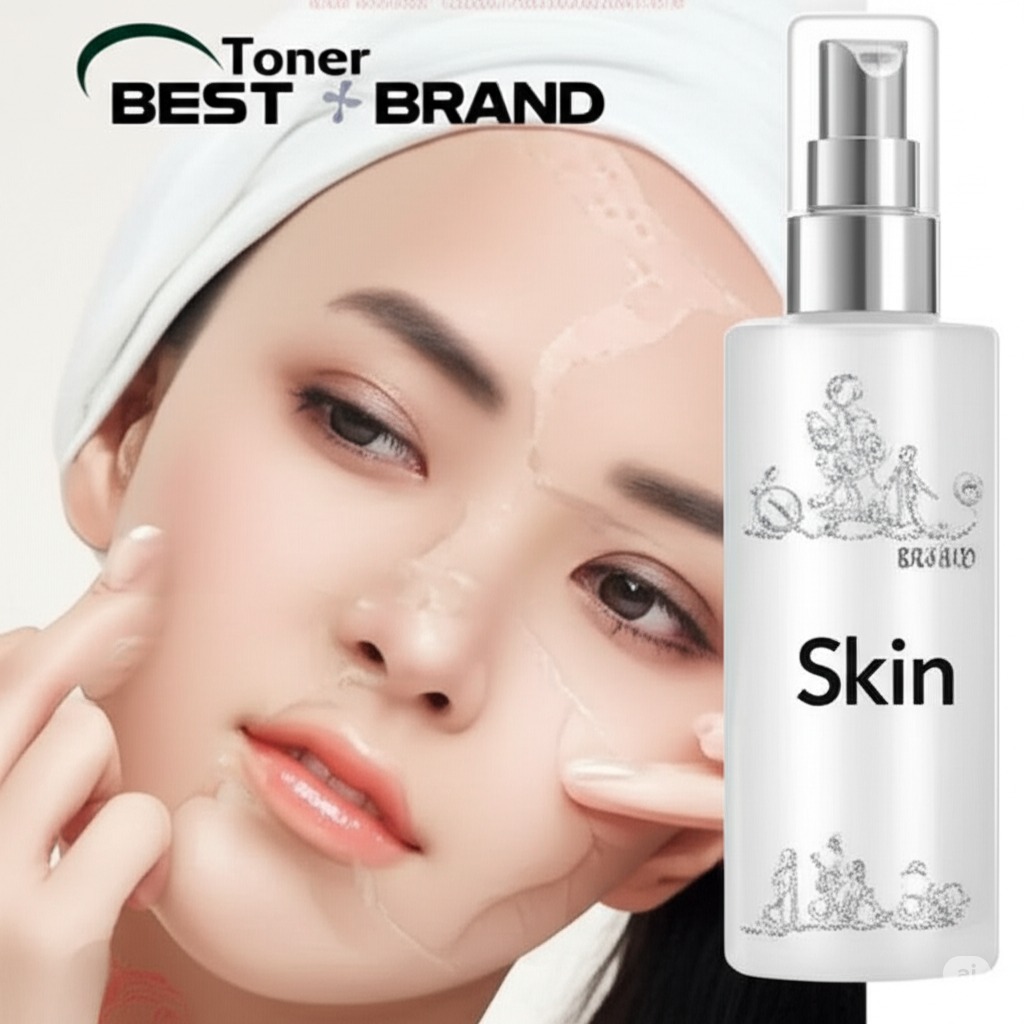Let’s be honest — toner is probably the most confusing skincare step ever. Do you need it? Is it just overpriced water? Will it dry out your face or help? What does Toner do for your Skin
If you’ve ever asked, “What does toner do for your skin?” — this is your ultimate, no-fluff guide. We’re diving deep into how toner works, why it’s more than a glorified cleanser, and how the right toner can level up your skincare routine like nothing else.
Spoiler: Toner isn’t optional. It’s your secret weapon — if you know how to use it right.
What Is Facial Toner?
Toner is a water-based liquid that’s applied to your face after cleansing but before serums or moisturizers. Think of it as a primer for your skin — it preps, refreshes, and balances.
Types of Toners
Hydrating Toners – Add moisture and improve product absorption.
Astringent Toners – Tighten pores and reduce oil.
Exfoliating Toners – Contain acids like glycolic or salicylic to remove dead skin cells.
A Quick History Lesson
Old-school toners from the ’80s and ’90s were harsh, alcohol-heavy formulas that stripped skin. But modern toners are skincare MVPs — formulated with hydrating, soothing, and barrier-repairing ingredients.
What Does Toner Do for Your Skin?
1. Restores Your Skin’s pH Balance
Cleansers can throw off your skin’s natural acidity. Toners rebalance it, calming and prepping your skin.
2. Preps for Better Product Absorption
Ever feel like your serum just sits on top of your skin? Toner helps ingredients sink in faster and deeper.
3. Removes Residual Dirt, Oil & Makeup
Even after cleansing, residue can linger. Toner sweeps away leftover gunk, preventing clogged pores.
4. Minimizes the Appearance of Pores
While it doesn’t shrink pores permanently, toner can tighten their appearance, making skin look smoother.
5. Hydrates and Nourishes
Especially if it contains ingredients like glycerin or hyaluronic acid, toner delivers an instant hit of moisture.
6. Calms Irritated Skin
Soothing toners can reduce redness, inflammation, and sensitivity, especially after exfoliation or sun exposure.
7. Brightens and Evens Tone
Toners with niacinamide, AHAs, or botanical extracts help fade dark spots and boost radiance over time.
Different Types of Toners & Their Benefits
- Hydrating Toners
for: Dry, dehydrated, or mature skin
Key Ingredients: Hyaluronic acid, aloe vera, rosewater
- Exfoliating Toners
Best for: Dull, acne-prone, or textured skin
Ingredients: Glycolic acid, salicylic acid, lactic acid
- Astringent Toners
Best for: Oily and combination skin
Ingredients: Witch hazel, tea tree oil
- Calming Toners
Sensitive, red, or rosacea-prone skin
Key Ingredients: Chamomile, green tea, calendula
How to Use Toner Correctly
When to Apply Toner
Right after cleansing, morning and night.
How Much to Use
A few drops on a cotton pad or clean palms. A little goes a long way.
Best Application Methods
Cotton pad: Sweeps away residue
Hands: Presses hydration directly into the skin
Spray bottle: Great for midday refreshers
How to Choose the Right Toner for Your Skin Type
Dry Skin
Go for hydrating toners with hyaluronic acid, rose water, or oat extract.
Oily Skin
Try astringent toners with witch hazel or tea tree — alcohol-free, please!
Combination Skin
Balance it out with dual-action toners — hydrating but lightly exfoliating.
Sensitive Skin
Choose fragrance-free calming toners with aloe or chamomile.
Acne-Prone Skin
Use BHA-based toners (like salicylic acid) to decongest pores.
Mature Skin
Look for toners with peptides, antioxidants, or mild exfoliants to improve tone and texture.
Ingredients to Look For in Toners
Hydrating
Glycerin
Hyaluronic acid
Aloe vera
Exfoliating
Glycolic acid
Salicylic acid
Lactic acid
Soothing
Rosewater
Chamomile
Green tea
Brightening
Niacinamide
Vitamin C
Licorice root
Avoid Alcohol!
It’s drying and irritating, especially for sensitive or dry skin types.
Common Toner Myths Debunked
“Toners dry out your skin.”
That was true decades ago. Today’s formulas are nourishing and gentle.
“Only oily skin needs toner.”
Toner benefits every skin type, especially hydrating formulas.
“Toner is just fancy water.”
Wrong! Active ingredients in toner restore, treat, and enhance your skin’s texture and tone.
Toner and Skincare Layering
The Golden Rule:
Cleanse → Tone → Treat → Moisturize → Protect
Toner vs Essence
prep and balance. Essences deeply hydrate and treat. Some products blur the line between the.
Can You Skip Toner?
Technically, yes. But if you’re skipping toner, you’re missing out on better absorption, hydration, and barrier support.

Toner for AM vs PM Routines
Morning Toner
Use a refreshing or hydrating toner to plump skin and prepare for SPF.
Nighttime Toner
Go for exfoliating toners to remove buildup and unclog pores before treatment products.
Popular Toners and Reviews
Thayers Witch Hazel
Alcohol-free, gentle, and great for oily or breakout-prone skin.
Klairs Supple Preparation Toner
Loved for its deep hydration and calming effect, perfect for all skin types.
Paula’s Choice BHA Liquid Exfoliant
One of the best for acne-prone skin — unclogs pores and refines texture.
Laneige Cream Skin Toner
A hybrid toner-moisturizer packed with ceramides and amino acids.
The Ordinary Glycolic Acid 7% Toner
Budget-friendly exfoliating toner for glow and smoothness.
DIY Natural Toners: Are They Worth It?
- Rosewater Toner
Gentle, fragrant, and hydrating — perfect for sensitive skin.
- Green Tea Toner
Packed with antioxidants to calm inflammation.
- Apple Cider Vinegar
It can balance pH and fight acne, but it may irritate sensitive skin. Always dilute it.
Toner for Different Skin Concerns
Acne
Salicylic acid-based toners unclog pores and reduce breakouts.
Redness or Rosacea
Look for calming botanicals like chamomile and aloe.
Dullness
Brightening toners with niacinamide or glycolic acid help.
Hyperpigmentation
Toners with vitamin C or licorice extract can fade dark spots over time.

Final Verdict: Do You Need Toner?
Toner isn’t a gimmick — it’s a game-changer when used correctly.
It bridges the gap between cleansing and treating your skin. Whether you want hydration, exfoliation, or calming effects, there’s a toner made for you. The key? Choose the right one for your skin’s needs and apply it like a pro.
FAQs
1. Is toner really necessary?
While not essential, toner greatly enhances the effectiveness of the rest of your skincare routine.
2. Can toner cause breakouts?
Some toners (especially ones with alcohol or irritating ingredients) can trigger breakouts. Choose one that suits your skin type.
3. How long should you wait after applying toner?
You can move on to your next step (serum or moisturizer) as soon as the toner is absorbed, usually within 30 seconds.
4. Can you apply serum without toner?
Yes, but toner helps serums absorb better and may reduce irritation from strong actives.
5. What is the difference between toner and micellar water?
Micellar water is a cleanser. Toner is a treatment step that follows cleansing to balance and prep the skin.

